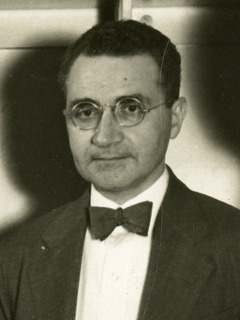Gioacchino Failla
Gioacchino Failla (1891–1961) was an influential Italian-American physicist and radiobiologist whose pioneering work significantly contributed to the fields of radiation therapy and radiobiology. Failla's research and innovations in measuring and applying radiation doses have had a lasting impact on medical treatments and safety protocols in the use of radiation for cancer treatment.
Early Life and Education[edit | edit source]
Gioacchino Failla was born in Italy in 1891. He pursued his higher education in physics and showed an early interest in the emerging field of radiology, which was still in its infancy at the time. After completing his studies, Failla moved to the United States, where he would spend the majority of his professional career.
Career[edit | edit source]
Failla's career was marked by his tenure at Columbia University, where he was instrumental in the establishment of one of the first radiobiology laboratories in the United States. His work at Columbia focused on understanding the biological effects of radiation on living tissues, a relatively new area of study at the time.
One of Failla's significant contributions was the development of the "Failla system" for measuring radiation doses, which provided a more accurate and standardized method for administering radiation therapy. This system played a crucial role in the advancement of radiation therapy as a viable treatment for cancer.
In addition to his work on radiation measurement, Failla was also interested in the protective measures against radiation exposure. He conducted extensive research on radiation shielding and safety, contributing to the development of guidelines and standards that are still in use today.
Legacy[edit | edit source]
Gioacchino Failla's contributions to the field of radiobiology and radiation therapy have left a lasting legacy. His work laid the foundation for modern radiation therapy techniques and safety protocols, improving the treatment outcomes for cancer patients worldwide. Failla's dedication to research and education also helped to establish radiobiology as a distinct scientific discipline.
Failla's impact is commemorated by the Gioacchino Failla Award, presented annually by the Radiation Research Society to individuals who have made outstanding contributions to the field of radiobiology.
Death[edit | edit source]
Gioacchino Failla passed away in 1961, leaving behind a rich legacy of scientific achievement and innovation. His work continues to influence the fields of radiobiology and radiation therapy, ensuring his place as a key figure in the history of medical physics.
Search WikiMD
Ad.Tired of being Overweight? Try W8MD's physician weight loss program.
Semaglutide (Ozempic / Wegovy and Tirzepatide (Mounjaro / Zepbound) available.
Advertise on WikiMD
|
WikiMD's Wellness Encyclopedia |
| Let Food Be Thy Medicine Medicine Thy Food - Hippocrates |
Translate this page: - East Asian
中文,
日本,
한국어,
South Asian
हिन्दी,
தமிழ்,
తెలుగు,
Urdu,
ಕನ್ನಡ,
Southeast Asian
Indonesian,
Vietnamese,
Thai,
မြန်မာဘာသာ,
বাংলা
European
español,
Deutsch,
français,
Greek,
português do Brasil,
polski,
română,
русский,
Nederlands,
norsk,
svenska,
suomi,
Italian
Middle Eastern & African
عربى,
Turkish,
Persian,
Hebrew,
Afrikaans,
isiZulu,
Kiswahili,
Other
Bulgarian,
Hungarian,
Czech,
Swedish,
മലയാളം,
मराठी,
ਪੰਜਾਬੀ,
ગુજરાતી,
Portuguese,
Ukrainian
Medical Disclaimer: WikiMD is not a substitute for professional medical advice. The information on WikiMD is provided as an information resource only, may be incorrect, outdated or misleading, and is not to be used or relied on for any diagnostic or treatment purposes. Please consult your health care provider before making any healthcare decisions or for guidance about a specific medical condition. WikiMD expressly disclaims responsibility, and shall have no liability, for any damages, loss, injury, or liability whatsoever suffered as a result of your reliance on the information contained in this site. By visiting this site you agree to the foregoing terms and conditions, which may from time to time be changed or supplemented by WikiMD. If you do not agree to the foregoing terms and conditions, you should not enter or use this site. See full disclaimer.
Credits:Most images are courtesy of Wikimedia commons, and templates Wikipedia, licensed under CC BY SA or similar.
Contributors: Prab R. Tumpati, MD

